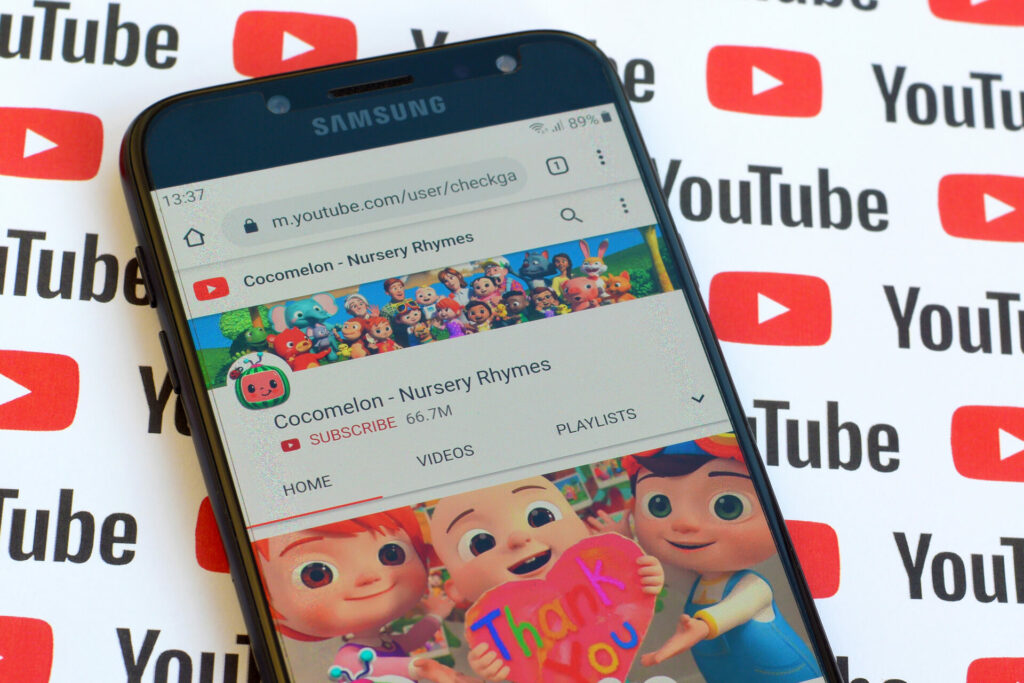You’ve likely heard the recent claim that kids’ TV shows, specifically Cocomelon, cause behavior issues in kids and that these shows have a drug-like effect on children.
The claim specifically states that these shows will cause children to grow up with behavioral disorders and poor self-regulation skills.
This is quite the claim. Is this true, though?
Will watching Cocomelon damage your child’s self-regulation skills for the long haul or is this just hype and fear-mongering?
Let’s look at where this idea originated and how fact-based it really is.

Analyzing the claim that Cocomelon damages children
Where this claim gets it right
A study published in the American Journal of Pediatrics shows that young children exhibited executive function difficulty, specifically in the area of delayed gratification after watching several minutes of a fast-paced cartoon. (Sponge Bob)
This is in contrast to the group of children in the study that were given a slower-paced show to watch.
The effects of the fast-paced show on executive function difficulty were short-term and were attributed to both the pace of the show and the fact that the fast-paced show was also based on fantasy. (Introducing fantastic images and ideas to young children uses extra cognitive resources and, therefore, can contribute to difficulty carrying out certain tasks immediately after the viewing.)
So, we see that there is some legitimate research about this topic.
All other areas of executive function between the two groups of children in this study were unaffected by the pace of the show – except the ability to delay gratification. This backs up the assertion that shows like Cocomelon can hamper a child’s self-regulation skills.
Where this claim gets it wrong
Jerrica Sannes says, about Cocomelon, that it leaves them “completely dysregulated” and that it makes it “impossible for them to play creatively and without entertainment”.
These assertions are not research-based.
The Instagram influencer and M.Ed continues on to call Cocomelon “essentially baby cocaine”.
These are all statements designed to elicit fear in parents. Nobody wants their most precious loved one to be addicted to something comparable to cocaine.
Fast frame changes vs slow paced TV shows: It’s not a new debate
Jerrica Sannes did not pull her theory that Cocomelon will damage the minds of millions of children out of thin air.
This idea was first brought to the masses about a decade ago in a TEDx video featuring Dimitri Christakis, MD. It made heavy rounds on social media at the start of the Covid pandemic when many parents started to feel the squeeze to limit screen time due to virtual learning.
The video, which I have included below, is research-based and very interesting. Dr. Christakis uses shows such as Baby Einstein and Powerpuff girls as examples, as Cocomelon had not yet reached fever-pitch.
His assertion is that face-paced television viewing is more harmful than slow-paced shows, like Mr. Rogers. In his talk, he gives some statistics from his own research and he draws the conclusion that hyper-stimulating TV shows are more damaging than slower-paced shows.
Dr. Christakis, in this video, also includes statistics from a study wherein parents spent varying amounts of time playing with blocks with their children.
The results show a positive correlation between vocabulary development and the number of time parents spent interacting face-to-face with their children.
The fact Dr, Christakis included the block study, which might seem off-topic, in his video ties into the real message of the speech.
The overarching takeaway of the video isn’t that fast-paced cartoons are bad and Mr. Rogers Neighborhood is good, but that caregivers should be cognizant about the importance of a child’s early development and how critical caregiver-child interaction is.
Will watching Cocomelon harm my child?
As of right now, there is no conclusive evidence that watching Cocomelon, within the AAP’s screen time recommended amount, is more harmful than watching any other cartoon in regards to long-term effects.
The AAP gives guidance that is specific to the amount of screen time children get. They also have recommendations on the type of content parents should discourage – Cocomelon isn’t on the list.
A final note
Research on the effects of different shows, screen mediums, and screen time in general, is important. We should always have our eyes and ears open for new information.
There is a recurring theme around every bit of screen time research, however – screens shouldn’t replace face-to-face interaction, physical activity, or co-regulation and bonding.
Whether you chose Cocomelon, Mr. Rogers, or anything in-between, remember to aim to stay within the recommended guidelines and not to let screens replace other activities as much as possible.
